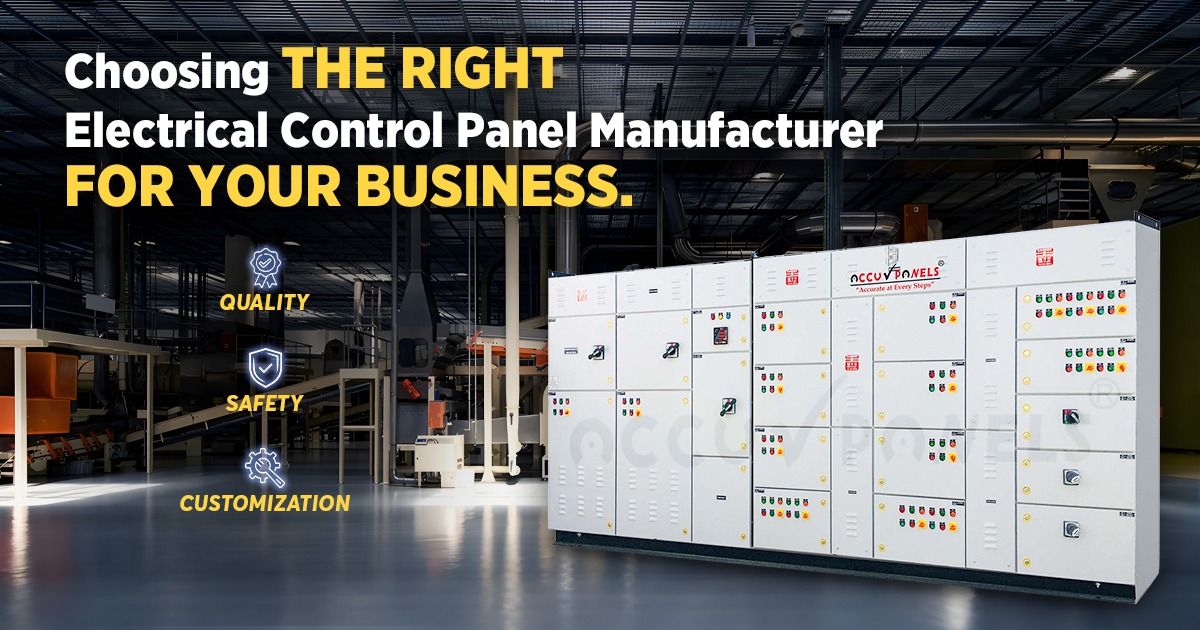Choosing the Right Electrical Control Panel Manufacturer: A Complete Guide
When managing complex electrical systems, selecting the right electrical control panel manufacturer is more than a technical choice—it’s a strategic business decision. Whether you’re sourcing electrical panels for industrial, commercial, or solar applications, the quality and reliability of your electrical LT panel or electrical power panel directly impact safety, efficiency, and long-term performance.
Why Choosing the Right Manufacturer Matters
The electrical control panel serves as the operational brain of your infrastructure. It governs power distribution, equipment coordination, and protective mechanisms. Choosing a trusted electrical panel manufacturer ensures reduced downtime, enhanced system performance, and compliance with global standards. It also provides access to long-term technical support and tailored solutions.
How to Choose the Best Electrical Panel Manufacturer
To find the best electrical control panel manufacturer, go beyond price and delivery timelines. Consider these key factors:
Experience and Expertise
Look for manufacturers with a proven track record in producing electrical LT panels and power panels. Industry-specific experience is crucial, especially in sectors like solar, utility, and commercial. Review their portfolio to assess their capabilities in delivering PCC, MCC, APFC, AMF, and Synchronizing Panels.
Quality and Certifications
Ensure the manufacturer is ISO 9001:2015 certified and follows strict quality control measures. Look for CPRI-approved panels with 65kA short-circuit testing and IP65 ingress protection. High-quality materials and components from trusted brands are essential for durability and performance.
Customization and Engineering Precision
The ability to customize panels to your operational needs is vital. Manufacturers should offer integration of advanced features such as remote monitoring, overload protection, and scalability. Compliance with IEC 61439 and other relevant standards ensures global acceptance and safety.
Technical Support and After-Sales Service
Responsive customer service is key for troubleshooting and upgrades. Evaluate the manufacturer’s support structure, availability, and maintenance offerings. Efficient production and delivery aligned with project timelines are also important.
Cost vs. Value
While competitive pricing is important, never compromise on quality. Consider the long-term value of the panel in terms of energy efficiency, ease of maintenance, and durability. Transparent warranty and service terms add to the overall value.
Evaluation Process: Step-by-Step
Start by researching and shortlisting electrical panel manufacturers in India, especially in regions like Ahmedabad and Gujarat. Prepare a detailed Request for Proposal (RFP) outlining your technical requirements. Compare responses and arrange site visits to inspect manufacturing capabilities and quality control processes.
Ask for references and read customer reviews to validate satisfaction. Once you’ve gathered all necessary information, make your final selection and negotiate contract terms including delivery schedules, warranty coverage, and customization agreements.
Accu-Panels Energy: A Leading Electrical Panel Manufacturer in India
Accu-Panels Energy stands out as a top electrical panel manufacturer in Ahmedabad and across India. With a strong presence in Gujarat, Accu-Panels delivers high-quality solutions including PCC, MCC, APFC, AMF, and Synchronizing Panels. Their ISO 9001:2015 certification and CPRI-approved LT panels reflect a commitment to safety, innovation, and engineering excellence.
Accu-Panels Energy offers solar LT panels up to 800V and ranks among the top 10 electrical panel manufacturers in India. Their dedication to customization, quality, and timely delivery makes them a preferred choice for industrial and commercial projects.
Key Considerations When Selecting a Panel
When choosing an electrical control panel, consider the following:
- Application and environment: Indoor, outdoor, industrial, or solar use
- Voltage and current ratings: Match with load requirements
- Enclosure type and IP rating: Protection against dust, water, and corrosion
- Component compatibility: Ensure seamless integration with existing systems
- Future scalability: Allow room for expansion and upgrades
- Compliance with electrical standards: IEC, ASTA, CE, and local codes
Understanding IEC 61439
IEC 61439 governs low-voltage switchgear and control gear assemblies. It covers design verification, routine testing, and performance evaluation. Compliance ensures global safety, reliability, and market acceptance.
LT Panel Capacity Explained
LT (Low Tension) Panels typically operate at 415V and are designed for low-voltage power distribution. Depending on the application, they can handle loads up to 1000V and are widely used in industrial, commercial, and residential sectors.
Final Thoughts
Choosing the right electrical panel manufacturer in India is a decision that shapes your project’s success. By evaluating technical capabilities, certifications, customization options, and support services, you ensure your infrastructure is powered by excellence.
For businesses seeking a trusted partner, Accu-Panels Energy offers unmatched quality, innovation, and service—making them a top contender among electrical panel manufacturers in Gujarat and beyond.










Ghanshyam Soni
Choosing the Right Electrical Control Panel Manufacturer
Selecting an electrical control panel manufacturer plays a vital role in the efficiency, safety, and success of your operations. By evaluating industry experience, engineering expertise, certifications, support services, and customization capabilities, businesses can make confident, informed decisions. Accu-Panels Energy stands out in India for its innovation, quality assurance, and wide portfolio of certified electrical panels.
What Needs to Be Considered When Selecting a Control Panel:
Intended application and operating environment
Voltage and current requirements
Type of enclosure and IP rating
Component compatibility with existing systems
Compliance with standards like IEC 61439
Scalability for future upgrades
Safety features and ease of operation
Thorough evaluation of technical, operational, and support factors leads to smarter investments and long-term reliability.